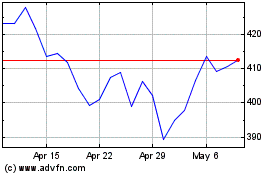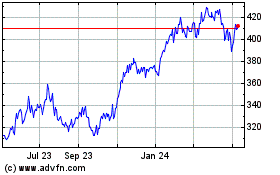U.S. court says firm needn't turn over personal data stored on
computers abroad
By Devlin Barrett and Jay Greene
Microsoft Corp. won a major legal battle with the U.S. Justice
Department Thursday when a federal appeals court ruled that the
government can't force the company to turn over emails or other
personal data stored on computers overseas.
The case, closely watched by Silicon Valley, comes amid tensions
between Europe and the U.S. over government access to data that
resides on the computers of social-media and other internet
companies.
The ruling is another setback for the Justice Department's
efforts to force technology companies to comply with government
orders for data, following the collapse earlier this year of two
cases involving Apple Inc.'s refusal to help open locked
iPhones.
The ramifications of Thursday's ruling by the Second U.S.
Circuit Court of Appeals in Manhattan could be sweeping. If the
appeals court's legal rationale stands, it also could influence
companies' and their customers' decisions about how and where to
store data. It also alter the course of talks between the U.S. and
other governments, in terrorism and criminal cases, about access to
evidence stored in servers on foreign soil.
Much of the data lately sought in such probes by European
investigators is kept on servers in the U.S. European officials,
particularly in Belgium, have complained that the current legal
framework makes it difficult to detect and prevent plots such as
the bombing of the Brussels airport earlier this year.
A Justice Department spokesman said Thursday's ruling undermines
public safety, and suggested the department might appeal to the
Supreme Court.
"We are disappointed with the court's decision and are
considering our options," the spokesman said. "Lawfully accessing
information stored by American providers outside the United States
quickly enough to act on evolving criminal or national- security
threats that impact public safety is crucial to fulfilling our
mission to protect citizens and obtain justice for victims of
crime."
In a statement, Microsoft President and Chief Legal Officer Brad
Smith called the decision "a major victory for the protection of
people's privacy rights under their own laws, rather than the reach
of foreign governments."
The company had argued that the U.S. government's position
violated national sovereignty and would open the door to other
countries seeking data stored in the U.S.
"As a global company, we've long recognized that if people
around the world are to trust the technology they use, they need to
have confidence that their personal information will be protected
by the laws of their own country," Mr. Smith said.
The case arose from a 2013 warrant issued by a federal judge in
New York for the emails of a suspect in a drug-trafficking probe.
Some of that data resided on Microsoft computers in Ireland.
Microsoft computers in Ireland. Microsoft fought the order in
court, arguing that it shouldn't be forced to comply with a U.S.
court order demanding data held in another country.
The Justice Department had argued that because Microsoft is
based in the U.S., the government has the authority to get the data
even if it is stored elsewhere, and asserted that there was no
conflict with Irish or European privacy laws.
Other major tech companies -- including Amazon.com Inc., Verizon
Communications Inc. and Cisco Systems Inc. -- as well as lobbying
groups such as the U.S. Chamber of Commerce and the Software
Alliance, filed legal briefs supporting Microsoft.
The case is part of a broader fight between Silicon Valley and
Washington over how much authority the government has to force
technology companies to help them gather data in investigations.
The companies argued that revelations about U.S. spying with the
help of telecom companies have heightened foreign sensitivities and
placed U.S. firms at a competitive disadvantage abroad.
In their legal briefs, Justice Department lawyers argued a
Microsoft victory could lead some American customers to claim a
foreign country of residence "for the specific purpose of evading
the reach of U.S. law enforcement."
In past cases, U.S. courts enforced subpoenas issued to banks
for business records held abroad, even when foreign law prohibited
it. The Second Circuit held in a 1984 ruling that control over
records, not their location, is what counts in such cases.
But Microsoft lawyers drew a distinction between business
records and emails. "A bank can be compelled to produce the
transaction records from a foreign branch, but not the contents of
a customer's safe-deposit box kept there," they wrote in their
Second Circuit brief. "A customer's emails are similarly private
and secure and not subject to importation."
Alex Abdo, an attorney at the American Civil Liberties Union,
said the ruling exposes the failure of Congress to modernize
privacy laws for the digital age so they spell out more clearly
how, when, and how much data can be searched by the government, and
make the process more transparent.
"It's shameful that Congress has yet to fix the flaws in our
privacy laws," said Mr. Abdo. "In the same way that a court ruling
on the National Security Agency phone program forced Congress'
hand, this may too."
In the ruling, the appeals court concluded Congress didn't
intend the warrant provisions of the Stored Communications Act to
apply beyond U.S. borders.
"The focus of those provisions is protection of a user's privacy
interests," the judges wrote. "Accordingly, the SCA does not
authorize a U.S. court to issue and enforce an SCA warrant against
a United States-based service provider for the contents of a
customer's electronic communications stored on servers located
outside the United States."
The ruling is the largest legal victory for Microsoft to date in
a number of disputes with the government about searches of its
customers' data.
In April, Microsoft sued the Justice Department, challenging the
constitutionality of government orders barring tech companies from
telling customers when federal agents have examined their data.
That case is pending.
The company in 2013 also challenged restrictions that limit the
disclosure of details regarding secret orders to turn over user
data in U.S. surveillance efforts sought under the Foreign
Intelligence Surveillance Act. That matter was resolved in 2014
when the government agreed to permit tech companies to publish some
aggregated data about such orders.
Jennifer Daskal, a professor at American University in
Washington who specializes in criminal and national security law,
said the government almost certainly would appeal, given the
stakes.
"One of the most notable pieces of this case is the degree to
which the court recognizes how emails and internet-service
providers are different from banks and business records. They
refused to extend the banking analogy to emails and recognized the
distinct privacy issues at stake with personal communication," Ms.
Daskal said.
The ruling, she said, puts "an enormous amount of pressure" on
what all sides agree is the outdated and poorly-functioning current
legal framework for cross-border data requests, and is likely to
lead to greater calls for Congress to update electronic privacy
laws.
Write to Devlin Barrett at devlin.barrett@wsj.com and Jay Greene
at Jay.Greene@wsj.com
(END) Dow Jones Newswires
July 15, 2016 02:48 ET (06:48 GMT)
Copyright (c) 2016 Dow Jones & Company, Inc.
Microsoft (NASDAQ:MSFT)
Historical Stock Chart
From Mar 2024 to Apr 2024

Microsoft (NASDAQ:MSFT)
Historical Stock Chart
From Apr 2023 to Apr 2024
